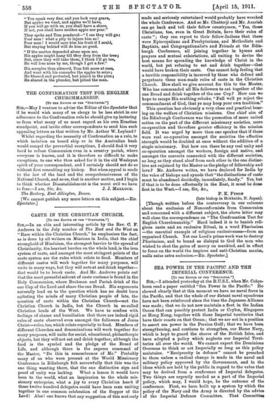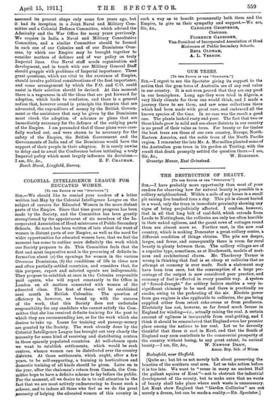SEA POWER IN THE PACIFIC AND THE IMPERIAL CONFERENCE.
[To THE EDITOR OF THE "SPECTATOR."] Sin,—I attended yesterday at the R.U.S.I., when Mr. Coign- houn read a paper entitled "Sea Power in the Pacific." He showed clearly that at this moment we have no naval force in the Pacific, and that the whole of our distant naval squadrons have not been reinforced since the time the Japanese Alliance was made; that we do not now maintain a fleet in the Indian Ocean that can possibly protect India or Ceylon, Singapore or Hong Kong, together with those Imperial territories that have their coasts on that Ocean ; that we are not in a position to assert sea power in the Persian Gulf ; that we have been strengthening, and continue to strengthen, our Home Navy, which is kept to guard the shores of the British Isles, and have adopted a policy which neglects our Imperial Terri- tories all over the world. We cannot expect the Dominions Overseas to think or act Imperially so long as this policy maintains. "Reciprocity in defence" cannot be preached to them unless a radical change is made in the naval and military policy approved by the Government, and in the ideas which are held by the public in regard to the valve that may be derived from a conference of Imperial delegates. Two things are urgently needed as a part of the Imperial policy, which may, I would hope, be the outcome of the conference. First, we have built up a system by which the policy of the Navy and the Army is directed by the advice of the Imperial Defence Committee. That Committee
assumed its present shape only some few years ago, but it had its inception in a Joint Naval and Military Com- mittee and a Colonial Defence Committee, which advised the Admiralty and the War Office for many years previously. We require in India, a Naval and Military Consultative Committee, and a similar Committee should be formed in each one of our Colonies and of our Dominions Over- seas, by which our Empire may be brought together to consider matters of defence and of war policy on truly Imperial lines. Our Naval staff needs organisation and development, and in touch with our Military General Staff should grapple with problems of Imperial importance. These great questions, which are vital to the existence of Empire, should involve political considerations of the first importance, and some arrangement by which the F.O. and C.O. could assist in their solution should be devised. At this moment there is a vagueness in all the ideas that are put forward for adoption, which leads to confusion, and there is a general notion that, however sound in principle the theories that are advocated, the expenditure of money by the British Govern- ment or the assistance that may be given by the Dominions must check the adoption of schemes or plans that are immediately necessary for the defence of the outlying parts of the Empire. I am persuaded that if those plans were care- fully worked out, and were shown to be necessary for the safety of the Empire, the British Government and the Governments of India and of the Dominions would have the support of their people in their adoption. It is surely unwise to delay and to await the Conference before initiating a truly Imperial policy which must largely influence its decisions.— I am, Sir, &c., E. F. CHAPMA.N. Beech Hurst, Lingfield, Surrey.





































 Previous page
Previous page